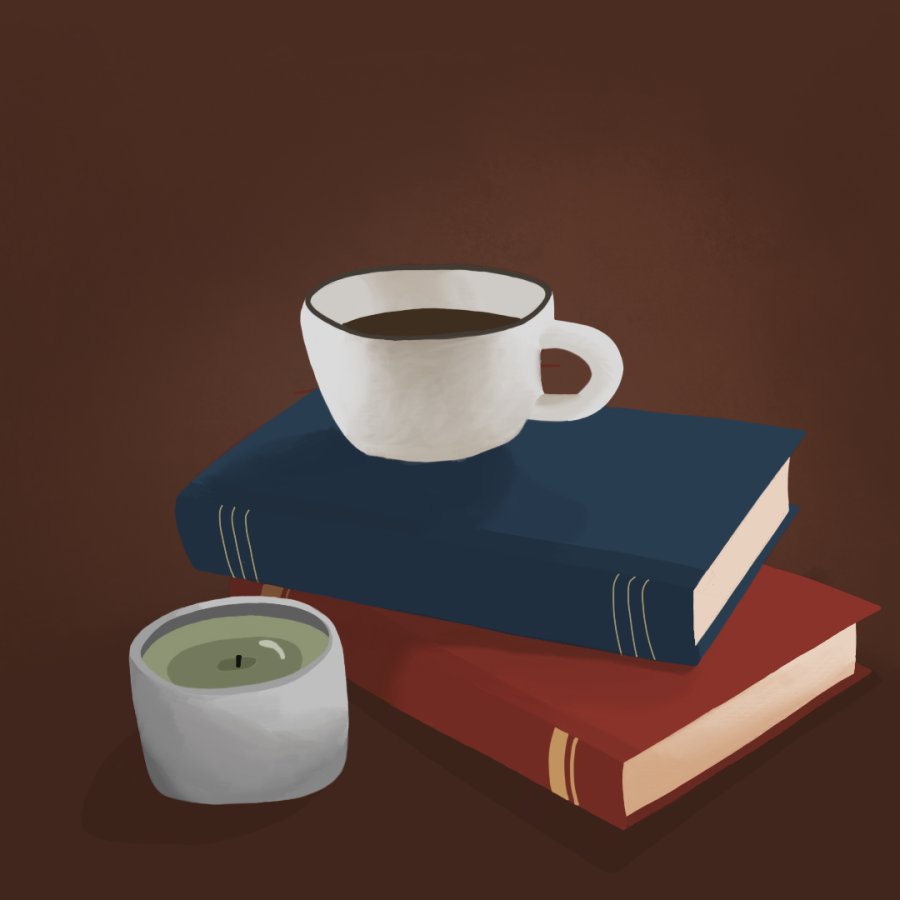Winter Books II
December 15, 2022
Winter: the season that garners the most discourse amongst us. A great period of juxtaposition. Warm layers against bitter winds, the purest of snow and the most vibrant blue
sky, a visible breath rising into the four p.m. sunset. Then there is the omnipresent feeling of gloom that arrives with the gray weather, which is the worthy opponent of snow days and movie
nights. Due to the versatility of this season (that somehow unites us all as we trek through it), I think it is vital that everyone who reaches out to the literary realm for comfort finds something
that makes them feel understood. “Cosy: The British Art of Comfort” is a self-explanatory guide to a wintertime of utmost chill. “Six of Crows” is THE novel to get lost in over winter break, the
only book that could give it a run for its’ money is “Tenant of Wildfell Hall.”
Rich like dark chocolate cocoa, “Six of Crows” by Leigh Bardugo is a storytelling masterpiece. This book has gained a cult of young adult fantasy fans who praise for it the
compelling cast of characters and unorthodox setting. Ketterdam is an intriguing city; it ticks only because of the thriving capitalist economy. In other words, the place is run by gangs and merchants, your wallet is already gone, and you probably just got tricked into signing away your savings. Kaz Brekker exemplifies Ketterdam. When he is offered the job (heist) of a lifetime that will make him richer than the previously mentioned winter beverage, Kaz assembles the ideal crew. Inej: a spy and a saint. Jesper will have your back unless distracted by anything shiny. Nina, who is strong and extremely vulnerable, and Matthias, who would betray them in a second, but cannot. The mere thought of the Crows makes me want to slink back into this universe and read it forever. Bardugo’s writing is immersive and merciless. The constant pursuit of survival is imitative enough of winter, only furthered by the cold descriptions of a remote prison and the Ice Court. Dark, fast-paced, and shockingly warm (I am weak for the found family trope), this book is your next read.
“Cosy: The British Art of Comfort” by Laura Weir is the first time I have read a book that accurately depicts debilitating seasonal depression. Somehow, whether it be through the whimsical illustrations or the step-by-step teatime instructions, whilst reading I began to feel like seasonal sadness may be less of a burden and more of an invitation to embrace the cold, the rain, and the brief days. Weir beautifully states, “In the British Isles, being cold gives us permission to be lazy, and there is nothing better than that. Stopping still and cosying up has become the greatest luxury of our time.” The bow on the present is that this book doubles as escapism; “Cosy” is a frosted window into British culture, with chapters like “Cosy Stays,” that illustrates options for your next trip to the English countryside, and “Cosy Feasts” because, “Is there anything less cosy than a salad?” I read this book in one sitting, after spraying evergreen scent all over my room. The tone is akin to a chat with a pal, thanks to loads of pop culture references and candidness. This sweet nonfiction appeals to all as it approaches coziness from a scientific point of view (sweaters are good for our psyche), aesthetic lists of ideas to get started, and warm encouragement. Even the book itself deigns to be lazy, as it incorporates passages and quotes from foremost experts on comfort: interior designers, fashion designers, authors, Alice (of Wonderland), and Jo March.
Dubbed the first feminist novel, “The Tenant of Wildfell Hall” by Anne Brontë is a wild story of scandal and intrigue. It begins with the point of view of Gilbert Markham, who is writing update letters to a friend about a woman he is increasingly interested in, due to her peculiar situation. The woman only known as “Mrs. Graham” has just occupied a gorgeous gothic manor, *sarcastic gasp* on her own! The sniveling, gossipy townspeople continually pay visits to her, scrambling for morsels of information. Gilbert, does a terrible job at forming a civil relationship, and Mrs. Graham wastes no time in detesting him. The entrepreneurial Graham displays radical ideas about how to earn a living and raise children, shown through her careful care of her son and the sales of her paintings. After a tumultuous turn of events, Gilbert learns Mrs. Graham’s real name, Helen, and of her past of toxic men that are cause for catharsis and her tough disposition. The book soon switches style, detailing Helen’s life through journal entries from her youth and young adulthood, torrid relationships, and a final last-ditch escape. This novel spirals until you cannot take it, and then reveals the truth in one sweeping wave of vulnerability that keeps your eyes plastered open and glued to the page. The feminist themes are present in Brontë’s writing of gender equality as if it is commonplace, though what she was doing was brave beyond reason. This book is an in-one-sitting book, it is a breakfast-until-dinner book. Exploring movements in a 19th century setting that are relevant today was an enlightening experience. The varying views of Helen are applicable to modern archetypes. Wander around Wildfell Hall and as you get to know Helen, allow the realization to dawn on you that Amy March was right, the Brontës were geniuses.
Going into this controversial season at the prime of cozy, arm yourself against the cold with a book and a cup of coffee. Be daring with the Crows, experience winter in the English countryside, or come to dinner at the Markham house, we are all discussing that mysterious new tenant. There is still adventure to be had.




